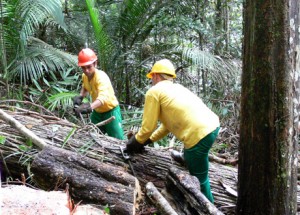 Established in 1993 as a response to concerns over global deforestation, FSC is a pioneer forum where the global consensus on responsible forest management convenes and through democratic process effects solutions to the pressures facing the world’s forests and forest-dependent communities.
Established in 1993 as a response to concerns over global deforestation, FSC is a pioneer forum where the global consensus on responsible forest management convenes and through democratic process effects solutions to the pressures facing the world’s forests and forest-dependent communities.
Within this forum, voices from the Global North and South, from organizations big and small, assemble to define environmentally appropriate, socially beneficial and economically viable forest management and identify the tools and resources that will effect positive, lasting change.
As a multi-stakeholder organization, FSC applies the directive of its membership to develop forest management and chain of custody standards, deliver trademark assurance and provide certification services to a global network of committed businesses, organizations and communities.
 FSC certification provides a credible link between responsible production and consumption of forest products, enabling consumers and businesses to make purchasing decisions that benefit people and the environment as well as providing on-going business value.
FSC certification provides a credible link between responsible production and consumption of forest products, enabling consumers and businesses to make purchasing decisions that benefit people and the environment as well as providing on-going business value.
FSC is nationally represented in more than 50 countries around the world. FSC has membership status with the following organizations:
International Social and Environmental Certification and Labelling Alliance (ISEAL) and International Union for Conservation of Nature (IUCN)
FSC certification is a voluntary, market-based tool that supports responsible forest management worldwide. FSC certified forest products are verified from the forest of origin through the supply chain. The FSC label ensures that the forest products used are from responsibly harvested and verified sources.
The FSC Principles and Criteria (P&C) describe how forests can be managed to meet the social, economic, ecological, cultural and spiritual needs of present and future generations. Developed through a strong, multi-stakeholder process, they include managerial aspects as well as environmental and social requirements.
